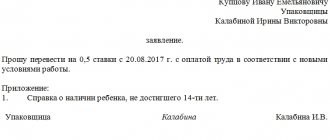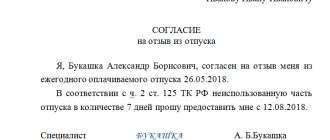The concept of “time off” was excluded from the legal field with the introduction of the modern Labor Code to replace the then existing Labor Code in 2002.
Dear readers! The article talks about typical ways to resolve legal issues, but each case is individual. If you want to find out how to solve your particular problem , contact a consultant:
+7 (499) 110-56-12 (Moscow)
+7 (812) 317-50-97 (Saint Petersburg)
8 (800) 222-69-48 (Regions)
APPLICATIONS AND CALLS ARE ACCEPTED 24/7 and 7 days a week.
It's fast and FREE !
Now the article of the Labor Code of the Russian Federation classifies this concept as additional rest time, and the conditions for its provision are strictly regulated.
What does the law say?
The law says that an employee has the right to independently determine how payment will be made for previously worked time.
The previously worked period includes:
- overtime, the definition of which is contained in Article 152 of the Labor Code of the Russian Federation;
- performance of labor duties on weekends and holidays, as evidenced by Article 113 of the Labor Code of the Russian Federation;
- the work of full-time employees in emergency, emergency or dangerous situations, the concept of this work in Article 113 of the Labor Code of the Russian Federation;
- work beyond the time specified in the contract, subject to the use of a rotational schedule, Article 301 of the Labor Code of the Russian Federation.
The norms of modern labor law give the employee the opportunity to receive compensation for this kind of overtime if it was carried out due to an urgent production need, initiated by the employer and documented.
What do you mean by recycling?
The amount of overtime time for performing labor functions is limited by the Code and is no more than 4 hours, which can be accumulated over no more than two consecutive days.
In emergency cases, which are described in Article 113 of the Code, this time may be increased.
Labor Code of the Russian Federation
In order for an employer to be able to involve its employee in the performance of his work duties in his free time, it is necessary that one of the conditions be met:
- an emergency or threat of an emergency when the presence of an employee on site is required to reduce or eliminate the consequences of an accident;
- a situation of possible damage to goods, equipment, other property or its destruction, if the presence of an employee on site directly prevents such risks;
- threat of disaster, martial law, accident, natural disasters.
What is not considered overtime work?
An employee’s individual desire to go to work on a day off in order to fulfill his official duties is not overwork.
Such actions must be agreed upon with management, even if this is dictated by common sense considerations, then you can count on time off for overtime.
A little about terminology
The legislation provides for certain working time standards that are established for the employee at the time of concluding the relevant contract with him.
In particular, the legislation provides for the following:
- the standard working hours per week is 40 hours;
- for those jobs the performance of which is associated with special conditions, a reduced working day is provided. In this case, a list of such positions is established in special directories.
Overtime is considered to be exceeding the working hours established for a specific type of work activity. For workers who work shorter hours, the norm is a certain number of hours per shift.
The need for processing may arise in the following cases:
- at the initiative of the employee. Very often there are cases when an employee is late at work on his own initiative. The reason for the delay may be the need to perform urgent work or a violation of work schedule. In this case, additional time worked is not paid.
- at the request of the employer. In this case, it is necessary to obtain the written consent of the employee. It is also necessary to draw up an appropriate order and document the duration of processing.
The need for processing may arise in different cases. For example, it may be needed to complete complex work or to carry out urgent and urgent operations, etc.
At the same time, some issues regarding the performance of overtime work should be reflected in local regulations or in a collective agreement.
In particular, such questions include:
- a list of positions that may require overtime work;
- the procedure and process for attracting employees;
- payment, etc.
Determining the duration of processing depends on the standardization period established in a particular enterprise. After the end of this period, the HR department employee must calculate the duration of overtime. An exception is provided only for those employees who work according to a drawn-up schedule: in this case, the calculation of the duration of overtime is carried out within an annual period of time.
The need to determine the billing period is justified by the fact that after its end the employee must choose a certain method of receiving compensation.
Time off or pay?
Until 2002, when the Labor Code was in force, time off was considered the priority method of compensation.
This followed from the provisions of Article 64, in which the provision of additional days off occurred by default, and the issue of the possibility of replacing rest with monetary compensation was agreed upon by the parties individually.
The Labor Code proposed the opposite position.
Today, officials who were involved in work for more than the allotted time receive financial compensation by default.
The employer, in principle, can make amendments to internal administrative documents, according to which compensation is made either in the form of additional time off, or only in money, however, knowing the rules of the law, the employee will always be able to challenge them.
Whether time off is paid or provided in the form of additional rest time is decided jointly by the employer and the employee.
Providing time off for overtime
Based on existing legal norms, the issue of providing additional days off is regulated through dialogue between the employer and his employee.
However, there are certain groups of workers who, regardless of the employer’s wishes, have a legal right to rest for overtime work.
Who is eligible?
The law obliges to provide the opportunity for rest only to an employee who is a blood donor.
In this case, a person can rest on the day of blood donation, which is indicated in the certificate, as well as on the next working day.
For other categories of employees, compensation for overtime will be legally expressed in cash.
In order to still get a day off instead of payment, you can use other methods:
- Contact your manager with a request to split your vacation into several fragments and register your time off as days of your next vacation. In this case, you will have to submit an application as in the general case, that is, 14 days in advance, and wait for consideration, so this method is not suitable for situations that require an urgent solution.
- Ask for leave without pay, that is, take official time off at your own expense for the required number of days.
How to calculate the amount of overtime?
The calculation of excessively worked time is carried out by the accounting department on the basis of a working time sheet, which records the entire work process.
Recycling is detected as soon as it has been done. The recording of working time standards and the marking of attendance and absence on the timesheet is carried out in hours.
The government annually publishes a normative document - a time sheet-calendar, which approves the norms of daily, weekly, monthly and annual working hours and rest periods for various work modes.
Overtime is the time that an employee is forced to spend in excess of the legal limit, and is measured in hours, therefore, to record it, the employer is required to keep a time sheet.
Time spent in excess of the required standards is calculated by a personnel service employee, but the law establishes the frequency of such calculation - twice a month
In practice, personnel officers most often make such calculations only at the end of the month, although working hours are recorded continuously.
When concluding a contract, the employer and employee indicate the duration of working hours.
If it is important for an employee to receive compensation in the form of time off, he should independently keep records of overtime based on the normal length of time known to him, and as soon as the number of hours of reasonable overtime reaches 8, he can submit a statement to his manager.
It is important to remember that only the time that was used on the initiative and direct instructions of the manager is considered overtime.
Working on a weekend - pay or time off? What to choose? Find out from our article. How much time off can you take at your own expense? See here.
How to calculate the number of days?
All types of days off, vacations and time off are calculated in whole days.
Thus, to calculate overtime, you need to add up the number of hours and convert them into whole days.
According to the law, overtime as compensation for time must be provided for a period no less than that which was worked overtime; excess compensation is allowed.
Example:
Employee A. worked 13 hours of overtime during one work week, but her work schedule provides for a 40-hour week.
To calculate time in whole days, you need to divide 13 hours by standard 8, which gives you one full day and 5 hours.
The law allows the employee to be given 2 days off, as well as to divide the compensation into parts, using both monetary and intangible ones.
If the employee has irregular working hours
When the specifics of an employee’s work function forces him to work irregular hours, this fact, although legal, does not relieve the employer from his direct obligation to comply with the norms of the Code.
In this case, the legal algorithm provides that the overtime work performed by the employee during the week is not taken into account.
For compensation, employees are given an additional three days to their vacation. However, this does not apply to holidays and legal weekends, overtime for which will have to be compensated on general terms, since the Code directly states this.
For military personnel
For military personnel, the law establishes a normal working day that corresponds to civilian occupations.
However, if necessary, a career military officer may be involved in overtime work, and the time of overtime work is not regulated and can be any in accordance with the decision of the command.
In this case, both monetary compensation, calculated based on the cost of a working day, and time off during the year or additional days to vacation, but not more than 30 in a row, are possible.
Let's understand the terminology
When hired, an employee is given a standard working time that meets the requirements of the Labor Code of the Russian Federation.
The legislation defines time standards:
- For positions and jobs with normal working conditions, the weekly duration is 40 hours.
- For work associated with special or harmful working conditions, a shortened working day is accepted. The benefit is established for specialties and positions approved by industry directories.
Exceeding the normal duration of labor accepted for a specific type of work is overwork. For workers with reduced working hours, the norm is a set number of hours per shift or workday. For example, external part-time workers may have a twenty-hour work week, which is their normal length.
The need to work beyond standard hours arises:
- At the request of the employee. If time is allocated incorrectly or in case of urgent delivery of an important object, the employee may be late at work after the end of the working day. Additional time is not overtime if the initiative comes from the employee and is a violation of work regulations.
- At the initiative of the employer. For excess work, the written consent of the employee, an order from the enterprise and documentary evidence of overtime are required.
The reasons for overtime may be the need to complete significant work, carry out repair and restoration operations, or replace a temporarily absent employee.
Local acts and the collective agreement of the enterprise must reflect:
- A list of positions or works for which duties may be performed overtime.
- The procedure for attracting workers to work above the norm.
- Amount of payment and the possibility of providing time off.
Determining the amount of overtime depends on the standardization period established at the enterprise. At the end of the period, the personnel employee must calculate the excess of the standards. The exception is for employees with a schedule, for whom the determination of excess of standards is determined within the framework of an annual period.
The need to introduce a billing period for the total calculation of overtime is explained by the fact that at the end of it the employee must determine the method of compensation.
According to the Labor Code of the Russian Federation
The size of the normal working week is established in Article 91 of the Labor Code of the Russian Federation. The norm is determined by federal legislation. The exact value of the norm is specified in the production calendar, approved annually. The document allows you to determine daily, weekly, monthly, quarterly standards for work with different durations.
The procedure for paying remuneration for overtime work is defined in Article 152 of the Labor Code of the Russian Federation.
This article of the Labor Code of the Russian Federation allows employees to be provided with additional rest time in an amount corresponding to overtime. Time off is granted at the request of the employee and his written application.
Exceptions
The legislation defines types of work for which the consent of employees is not required when performed overtime. To eliminate accidents, eliminate damage to utility networks, fires, natural disasters and prevent the consequences of other force majeure circumstances, enterprise employees are involved unconditionally.
It is not allowed to override the normal working hours for the following categories of persons:
- Under 18 years of age.
- Employees who have young children and are expecting the birth of a child.
- Employees undergoing training at the enterprise.
- Other categories whose overtime work may be prohibited for health reasons.
In legislation, the exceptional procedure for the execution of work is enshrined in Art. 99 of the Labor Code of the Russian Federation and Art. 203 Labor Code of the Russian Federation.
Violation of the procedure for attracting citizens to overtime work entails the imposition of an administrative fine on legal entities and officials.
If the processed time is not enough, you can try another method. Find out how to take 1 day off at your own expense.
Who is entitled to compensation for medications? See here.
How to write an application?
In order to write an application for time off, it is necessary to take into account that the concept of “time off” does not exist in Russian legislation, therefore the wording must contain one of the three above meanings - an additional day of rest, a day off without pay or on account of the next vacation.
Since the manager gives the order, the application must be written in his name.
Application example:
Example of an application for time off
Do you need an order from the employer?
Since wages are calculated and noted in the work time sheet based on an order, it is not known how to consider an employee’s absence from the workplace - authorized or unauthorized.
In order to avoid subsequent labor disputes and comply with all legal norms, an order should be issued to involve the employee in overtime work, specifying the conditions of compensation (rest or cash payment) and familiarize the employee with it against signature.
How to write an application for time off for donating blood? You will find a sample document in our article. What is the statute of limitations for taking time off? Find out here.
How to keep track of time off? Read here.
Example of an order:
Sample order for involvement in overtime work
Menu
In particular, there are certain works for which the employee’s consent is not required. Such work may include liquidation of an accident and its consequences, restoration of utility networks, fire extinguishing, etc. Employees may be involved in performing such work without written consent. The legislation also does not allow working hours to be exceeded for a certain category of workers. In particular, this category includes persons who:
- have not reached the age of majority;
- have young children or are pregnant;
- undergo training in the company;
- cannot perform such work due to their health condition.
Violation of the requirements established by law may become the basis for the application of an administrative fine.








